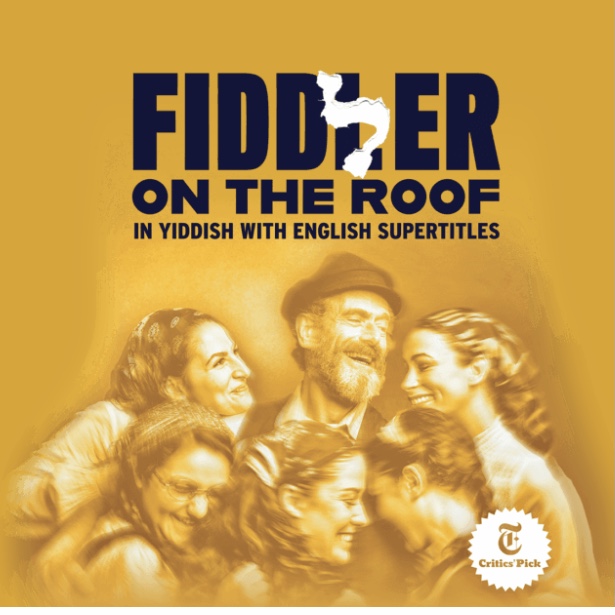
Tradition!
As a child I heard Yiddish spoken by my European-born grandparents and my first-generation American parents, yet I never had the curiosity to learn to speak it myself.
But my parents subscribed to New York’s Yiddish theatre company, the Folksbiene, and I’d go with them and follow the plays by reading the English supertitles.
When I met my husband I learned, surprisingly for our generation, that he spoke Yiddish and loved the language. And so we continued to go to the Folksbiene and other venues, where we saw wonderful Yiddish productions of plays including Death of a Salesman and Waiting for Godot, with me still reading the supertitles.
Then in 2018 the Folksbiene presented a highly acclaimed Yiddish production of Fiddler on the Roof directed by Joel Gray. It was mounted first at New York’s Museum of Jewish Heritage, and later transferred off-Broadway to Stage 42, and we saw both amazing productions.
Based on the Tevya stories by Sholem Aleichem, which were originally written in Yiddish, the play’s dialogue and lyrics were displayed creatively on the back of the stage in both Russian – to reflect its setting in czarist Russia’s Pale of Settlement – and in English.
But I knew the emotional story and its songs so well, I had no need for the English translation – all I needed was a hanky to wipe away my tears.
– Dana Susan Lehrman
This retired librarian loves big city bustle and cozy country weekends, friends and family, good books and theatre, movies and jazz, travel, tennis, Yankee baseball, and writing about life as she sees it on her blog World Thru Brown Eyes!
www.WorldThruBrownEyes.com



I heard lots of buzz about that production, Dana. It was acclaimed! We finally saw our first professional production shortly before the pandemic. It didn’t have a great Tevye, but is such a wonderful show that it didn’t matter. I used to use Far From the Home I Love as an audition piece.
Glad you saw it Betsy, I have also seen some productions that may have been miscast or otherwise far from perfect, but almost impossible to ruin that gem of a show!
Fiddler seems like the perfect production to see in Yiddish, Dana, because we all know the story so well, and the language fits the theme perfectly. Without having to concentrate on the plot, it’s possible to learn a few more Yiddish words. I wish my grandmother had insisted that I talk to her in Yiddish, but she wanted to practice her English with me.
You’re right Mare, Fiddler is the perfect show to be seen in Yiddish! And of course it’s a gem in any language – and well before the Yiddish version, the show had been translated into dozens of languages and performed in them all over the world including a widely acclaimed Japanese production.
And when the show first opened on Broadway in the 1960s in English, my aunt and uncle took my Ukrainian grandmother.
“Anatevka, it’s just like my village.”, she said.
Dana, as I’m sure I’ve told you before, my nephew was in the Yiddish Fiddler, and we got to meet Joel Grey and the whole cast. But I think anyone who saw it would agree that the translation into Yiddish was superb, and NOTHING was lost in translation.
Yes, I remember your nephew was in the production Suzy!
And perfectly said – NOTHING was lost in translation!
Wish I could have taken my grandparents to see that production. When my cousin and I took them to the traditional stage show, my grandfather proclaimed, “That’s not how it vas.” definitely something lost in translation.
I hope your grandfather enjoyed it anyway Laurie!
Dana, I had the same “Yiddish experience” as you did. Yiddish was practically a secret code, and although I picked up several dozen words and phases, the language was generally used when the adults were trying to keep things from the children.
I absolutely loved the Yiddish version of “Fiddler”. (I understand it was translated into Yiddish almost 50 years ago for an Israeli production.) The Yiddish lyrics resonated with me, as they did with you. The play seemed so much more authentic when Tevye says “Gut Shabbos” instead of “Good Sabbath”!
Thanx Sara, I do remember as a kid considering Yiddish as my parents’ “secret” language.
And indeed the Yiddish Fiddler was perfection in the eyes of this theatre-lover!
I’ve only seen the classic Zero Mostel film version. I’d love to see a subtitled Yiddish production.
Hope you get to see it Dave!